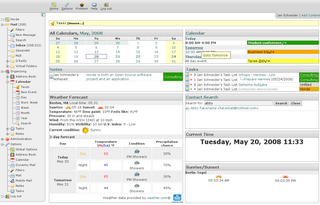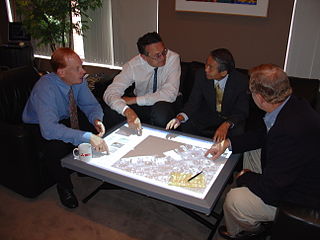Collaborative software or groupware is application software designed to help people working on a common task to attain their goals. One of the earliest definitions of groupware is "intentional group processes plus software to support them".
Computer-supported cooperative work (CSCW) is the study of how people utilize technology collaboratively, often towards a shared goal. CSCW addresses how computer systems can support collaborative activity and coordination. More specifically, the field of CSCW seeks to analyze and draw connections between currently understood human psychological and social behaviors and available collaborative tools, or groupware. Often the goal of CSCW is to help promote and utilize technology in a collaborative way, and help create new tools to succeed in that goal. These parallels allow CSCW research to inform future design patterns or assist in the development of entirely new tools.

SOGo is an open source collaborative software (groupware) server with a focus on simplicity and scalability.
The Croquet Project is a software project that preceded Croquet, and was intended to promote the continued development of the Croquet open-source software development kit to create and deliver collaborative multi-user online applications.
Calendaring Extensions to WebDAV, or CalDAV, is an Internet standard allowing a client to access scheduling information on a remote server. It extends WebDAV specification and uses iCalendar format for the data. The access protocol is defined by RFC 4791. It allows multiple client access to the same information, thus allowing cooperative planning and information sharing. Many server and client applications support the protocol. Extensions to CalDAV for automated scheduling are also standardized as RFC 6638.
Citadel is the name of a bulletin board system (BBS) computer program, and of the genre of programs it inspired. Citadels were notable for their room-based structure and relatively heavy emphasis on messages and conversation as opposed to gaming and files. The first Citadel came online in 1980 with a single 300 baud modem; eventually many versions of the software, both clones and those descended from the original code base, became popular among BBS callers and sysops, particularly in areas such as the Pacific Northwest, Northern California and Upper Midwest of the United States, where development of the software was ongoing. Citadel BBSes were most popular in the late 1980s and early 1990s, but when the Internet became more accessible for online communication, Citadels began to decline. However, some versions of the software, from small community BBSes to large systems supporting thousands of simultaneous users, are still in use today. Citadel development has always been collaborative with a strong push to keep the source code in the public domain. This makes Citadel one of the oldest surviving FOSS projects.
Kolab is a free and open source groupware suite. It consists of the Kolab server and a wide variety of Kolab clients, including KDE PIM-Suite Kontact, Roundcube web frontend, Mozilla Thunderbird and Mozilla Lightning with SyncKolab extension and Microsoft Outlook with proprietary Kolab-Connector PlugIns.

Horde is a free web-based groupware.

Citadel/UX is a collaboration suite that is descended from the Citadel family of programs which became popular in the 1980s and 1990s as a bulletin board system platform. It is designed to run on open source operating systems such as Linux or BSD. Although it is being used for many bulletin board systems, in 1998 the developers began to expand its functionality to a general purpose groupware platform.
David Alan Smith is an American computer scientist, inventor and entrepreneur. He is the founder and CTO of Croquet Corporation. He previously was the chairman of Gensym, one of the first public artificial intelligence companies, and later was Chief Innovation Officer and a Senior Fellow at Lockheed Martin Corporation, leading their augmented reality and virtual reality work.
This is a comparison of standards of mobile phones. A new generation of cellular standards has appeared approximately every tenth year since 1G systems were introduced in 1979 and the early to mid-1980s.
ArcGIS Server is the core server geographic information system (GIS) software made by Esri. ArcGIS Server is used for creating and managing GIS Web services, applications, and data. ArcGIS Server is typically deployed on-premises within the organization’s service-oriented architecture (SOA) or off-premises in a cloud computing environment.
Bynari is a defunct company based in Dallas, developing server and email software, mainly known for its Insight Family, similar to Microsoft Exchange Server with Outlook.
Group information management (GIM) is an extension of personal information management (PIM) "as it functions in more public spheres" as a result of peoples' efforts to share and co-manage information, and has been a topic of study for researchers in PIM, human–computer interaction (HCI), and computer supported cooperative work (CSCW). People acquire, organize, maintain, retrieve and use information items to support individual needs, but these PIM activities are often embedded in group or organizational contexts and performed with sharing in mind. The act of sharing moves personal information into spheres of group activity and also creates tensions that shape what and how the information is shared. The practice and the study of GIM focuses on this interaction between personal information and group contexts.
Clarence "Skip" Ellis was an American computer scientist, and Emeritus Professor of Computer Science and Cognitive Science at the University of Colorado at Boulder. While at the CU-Boulder, he was the director of the Collaboration Technology Research Group and a member of the Institute of Cognitive Science. Ellis was the first African-American to earn a Ph.D. in Computer Science (1969), and the first African-American to be elected a Fellow of the ACM (1997). Ellis was a pioneer in Computer Supported Cooperative Work (CSCW) and Groupware. He and his team at Xerox PARC created OfficeTalk, one of the first groupware systems. Ellis also pioneered Operational Transformation, which is a set of techniques that enables real-time collaborative editing of documents.

The DiamondTouch table is a multi-touch, interactive PC interface product from Circle Twelve Inc. It is a human interface device that has the capability of allowing multiple people to interact simultaneously while identifying which person is touching where. The technology was originally developed at Mitsubishi Electric Research Laboratories (MERL) in 2001 and later licensed to Circle Twelve Inc in 2008. The DiamondTouch table is used to facilitate face-to-face collaboration, brainstorming, and decision-making, and users include construction management company Parsons Brinckerhoff, the Methodist Hospital, and the US National Geospatial-Intelligence Agency (NGA).
Collaborative information seeking (CIS) is a field of research that involves studying situations, motivations, and methods for people working in collaborative groups for information seeking projects, as well as building systems for supporting such activities. Such projects often involve information searching or information retrieval (IR), information gathering, and information sharing. Beyond that, CIS can extend to collaborative information synthesis and collaborative sense-making.

Qubes OS is a security-focused desktop operating system that aims to provide security through isolation. Virtualization is performed by Xen, and user environments can be based on Fedora, Debian, Whonix, and Microsoft Windows, among other operating systems.
Carl Gutwin is a Canadian computer scientist, professor and the director of the Human–computer interaction (HCI) Lab at the University of Saskatchewan. He is also a co-theme leader in the SurfNet research network and was a past holder of a Canada Research Chair in Next-Generation Groupware. Gutwin is known for his contributions in HCI ranging from the technical aspects of systems architectures, to the design and implementation of interaction techniques, and to social theory as applied to design. Gutwin was papers co-chair at CHI 2011 and was a conference co-chair of Computer Supported Cooperative Work (CSCW) 2010.




